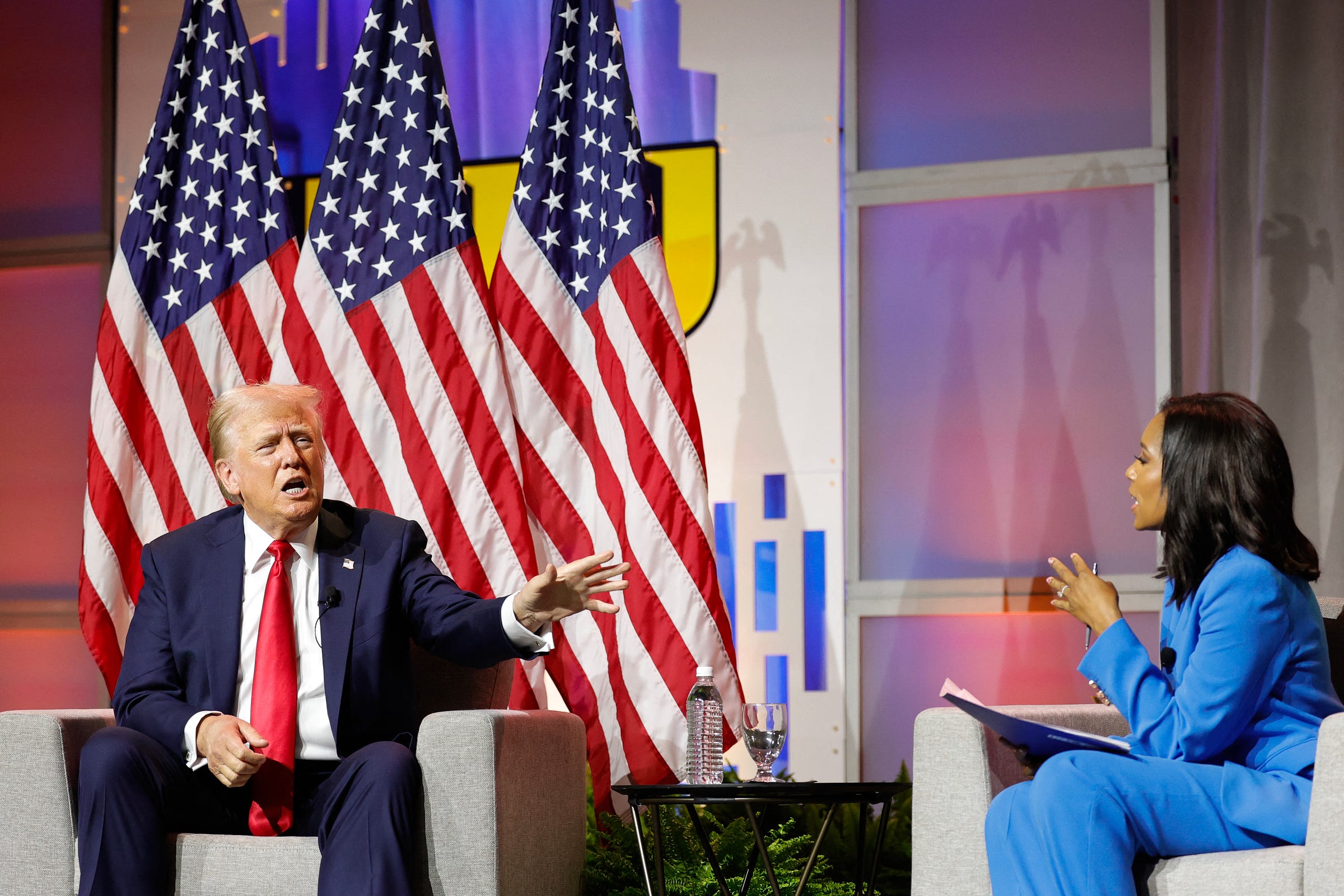Trump Is Okay with Political Violence (by His Supporters)
The ex-president may say he’s an ally of the police. But on Wednesday he made clear there are some cops he won’t support.

THREE WEEKS AGO, when a gunman tried to kill Donald Trump, President Joe Biden and Vice President Kamala Harris denounced the attack.
“There’s no place for this kind of violence in America,” said Biden. Harris agreed, adding: “We must all condemn this abhorrent act and do our part to ensure that it does not lead to more violence.”
Trump doesn’t share this view.
On Wednesday, in an interview hosted by the National Association of Black Journalists, Trump refused to condemn political violence committed by his supporters. Instead of blaming the insurrectionists who mauled police at the Capitol on January 6th, he blamed the cops who fought back—and the cops who didn’t.
During the interview, Kadia Goba, a political reporter at Semafor, asked Trump about the recent police shooting of Sonya Massey in Illinois. Goba explained that Massey, “an unarmed black woman,” had been fatally shot “in her home by a deputy sheriff.” Given the undisputed injustice of this shooting, she asked Trump why officers should be shielded by his preferred policy of qualified immunity from prosecution.
Trump said he didn’t like the sound of the Massey case. But he warned that without immunity, officers who made “an innocent mistake” might be “unfairly prosecuted.” Fighting crime was dangerous, he explained, and sometimes officers had to make “a very close call.” “Our police officers,” he argued, must “have the respect and dignity” they deserve.
Then the journalists onstage with Trump asked about a different confrontation: the one between police and his followers at the Capitol on January 6th. His attitude toward the cops abruptly shifted.
“You’ve called yourself the candidate of law and order,” Rachel Scott, the senior congressional correspondent for ABC News, told Trump. “When Time magazine asked you if you would consider pardoning all the rioters, you said, ‘Yes, absolutely.’”
Trump proudly affirmed that statement. “Sure,” he told Scott.
She went on:
You called them patriots. One hundred forty police officers were assaulted that day. Their injuries included broken bones. At least one officer lost an eye. One had two cracked ribs, two smashed spinal discs. Another had a stroke. Were the people who assaulted those 140 officers, including those I just mentioned, patriots who deserve pardons?
Scott wasn’t asking about people who had walked into the Capitol after the mob broke in. She was asking specifically about those who had attacked police. If Trump supported law enforcement and opposed political violence, there was an obvious answer to give: No. I won’t pardon them.
He didn’t give that answer. Instead, he changed the subject to vandals who were seen “spraying these incredible monuments” in Washington, D.C., to protest last week’s visit by Israeli Prime Minister Benjamin Netanyahu. “They fought with police. They fought with them much more openly than I saw on January 6th,” he said, falsely.
Scott persisted. “My question is on those rioters who assaulted officers” on January 6th, she repeated. “Would you pardon those people?”
“Oh, absolutely, I would,” Trump replied. “If they’re innocent, I would pardon them.”
Scott pointed out that the people she was talking about weren’t innocent. “They’ve been convicted,” she reminded Trump.
He brushed aside that point. “They were convicted by a very, very tough system,” he scoffed.
Trump’s message couldn’t have been clearer: He doesn’t accept jury verdicts against his supporters, just as he doesn’t accept jury verdicts against himself. When the justice system convicts Trump or his thugs, he attacks the system.
Scott reminded Trump that the facts in these cases were graphic and indisputable:
Sir, we’re talking about people that were seen beating officers with flagpoles, dragging them down the stairs. They’re on video. Have you seen that video, sir? You would pardon those rioters?
Again, Trump could have assured Scott and the audience that he wouldn’t pardon these assailants. At a minimum, he could have expressed sympathy for the wounded officers. Instead, he blamed the police for shooting one of the insurrectionists, Ashli Babbitt, as she led other rioters through a smashed interior doorway toward members of Congress who were cornered inside the Capitol. “They shot a young lady in the face who was protesting,” he fumed.
It was a telling reversal from Trump’s answer about qualified immunity. The cop who shot Sonya Massey might be justified, in his mind, but the cop who shot Ashli Babbitt—who was white—was a murderer.
Trump shrugged off the injuries his goons had inflicted on officers at the Capitol. “Nobody died that day,” he scoffed. His answer elided the eventual death toll: One officer died the day after January 6th, two committed suicide shortly after that, and two more killed themselves months later.
Trump also implied that the cops had invited people in. “What about the police that are ushering everybody into the Capitol?” he asked, alluding to a video that he and his allies have repeatedly misrepresented. The video shows officers trying to de-escalate the confrontation with Trump’s mob. Now he suggests that the failure of these officers to use force against the mob amounts to consent, even as he demands prosecution of the officer who shot Babbitt.
This is Trump’s view of crime and law enforcement: Political violence is indefensible, except when it’s committed by his supporters. Cops are heroes when they’re criticized or defunded by his enemies, but they’re fair game when they’re beaten up by his friends. The criminal justice system is impartial when it prosecutes minorities but corrupt and illegitimate when it prosecutes Trump and his henchmen.
“You can’t have two systems of justice,” Trump told the audience. That’s true. But that’s exactly what he wants to impose.




